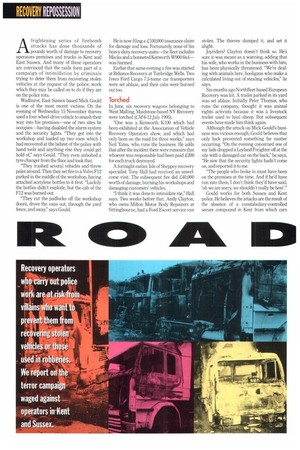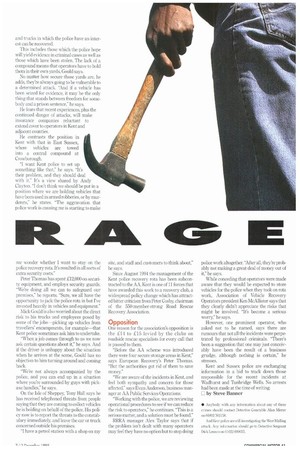RECOVERY REPOSSESSION
Page 42

Page 43

If you've noticed an error in this article please click here to report it so we can fix it.
Recovery operators who carry out police work are at risk from villains who want prevent them fro recovering stolen vehicles or thosel used in robberies. We report on the terror campaigrt waged against operators in Kent and Sussex.
Afrightening series of firebomb attacks has done thousands of pounds worth of damage to recovery operators premises and trucks in Kent and East Sussex. And many of these operators are convinced that the raids form part of a campaign of intimidation by criminals trying to deter them from recovering stolen vehicles at the request of the police; work which they may be called on to do if they are on the police rota.
Wadhurst, East Sussex-based Mick Gould is one of the most recent victims. On the evening of Wednesday 15 November thieves used a four-wheel-drive vehicle to smash their way into his premises—one of two sites he occupies—having disabled the alarm system and the security lights. "They got into the workshop and loaded up two vans which I had recovered at the behest of the police with hand tools and anything else they could get hold of," says Gould. "They even unbolted a tyre changer from the floor and took that.
"They trashed several vehicles and threw paint around. Then they set fire to a Volvo F12 parked in the middle of the workshop, having attached acetylene bottles to it first. "Luckily the bottles didn't explode, but the cab of the F12 was burned out.
"They cut the padlocks off the workshop doors, drove the vans out, through the yard fence, and away," says Gould.
He is now filing a £100,000 insurance claim for damage and loss. Fortunately none of his heavy-duty recovery units—the fleet includes Macks and a bonneted Kenworth W900 6x4— was harmed.
Earlier that same evening a fire was started at Reliance Recovery at Tunbridge Wells. Two Iveco Ford Cargo 7.5-tonne car transporters were set ablaze, and their cabs were burned out too.
Torched
In June, six recovery wagons belonging to West Mailing, Maidstone-based NY Recovery were torched (CM 6-12 July 1995).
"One was a Kenworth K100 which had been exhibited at the Association of Vehicle Recovery Operators show, and which had only been on the road for three weeks," says Neil Yates, who runs the business. He adds that after the incident there were rumours that whoever was responsible had been paid £200 for each truck destroyed.
A fortnight earlier, Isle of Sheppey recovery specialist Tony Hall had received an unwelcome visit. The subsequent fire did £40,000 worth of damage, burning his workshops and damaging customers' vehicles.
"I think it was done to intimidate me," Hall says. Two weeks before that, Andy Clayton, who owns Milton Motor Body Repairers at Sittingbourne, had a Ford Escort service van stolen. The thieves dumped it, and set it alight.
Joyriders? Clayton doesn't think so. He's sure it was meant as a warning, adding that his wife, who works in the business with him, has been physically threatened. "We're dealing with animals here, hooligans who make a calculated living out of stealing vehicles," he says.
Six months ago Northfleet-based European Recovery was hit. A trailer parked in its yard was set ablaze. Initially Peter Thomas, who runs the company, thought it was animal rights activists because it was a livestock trailer used to haul sheep. But subsequent events have made him think again.
Although the attack on Mick Goulds business was vicious enough, Gould believes that only luck prevented something far nastier occurring. "On the evening concerned one of my lads dropped a Leyland Freighter off at the site with a damaged car on the back," he says. "He saw that the security lights hadn't come on, and reported it to me.
"The people who broke in must have been on the premises at the time. And if he'd have run into them, I don't think they'd have said, 'oh we are sorry, we shouldn't really be here'."
Gould works for both Sussex and Kent police. He believes the attacks are the result of the absence of a constabulary-controlled secure compound in Kent from which cars and trucks in which the police have an interest can be recovered.
This includes those which the police hope will yield evidence in criminal cases as well as those which have been stolen, The lack of a compound means that operators have to hold them in their own yards, Gould says.
No matter how secure those yards are, he adds, they're always going to be vulnerable to a determined attack. "And if a vehicle has been seized for evidence, it may be the only thing that stands between freedom for somebody and a prison sentence," he says.
He fears that recent experiences, plus the continued danger of attacks, will make insurance companies reluctant to extend cover to operators in Kent and adjacent counties.
He contrasts the position in Kent with that in East Sussex, where vehicles are towed into a central compound at Crowborough.
"I want Kent police to set up something like that," he says. "It's their problem, and they should deal with it." It's a view shared by Andy Clayton. "I don't think we should be put in a position where we are holding vehicles that have been used in armed robberies, or by murderers," he states. "The aggravation that police work is causing me is starting to make me wonder whether I want to stay on the police recovery rota. It's resulted in all sorts of extra security costs."
Peter Thomas has spent £12,000 on security equipment, and employs security guards. "We're doing all we can to safeguard our premises," he reports. "Sure, we all have the opportunity to jack the police rota in but I've invested heavily in vehicles and equipment."
Mick Gould is also worried about the direct risk to his trucks and employees posed by some of the jobs—picking up vehicles from travellers' encampments, for example—that Kent police sometimes ask him to undertake.
"When a job comes through to us we now ask certain questions about it," he says. And if the driver is unhappy about the situation when he arrives at the scene, Gould has no objection to him turning around and coming back.
"We're not always accompanied by the police, and you can end up in a situation where you're surrounded by guys with pickaxe handles," he says.
On the Isle of Sheppey, Tony Hall says he has received telephoned threats from people saying that they are coining to collect vehicles he is holding on behalf of the police. His policy now is to report the threats to the constabulary immediately, and leave the car or truck concerned outside his premises.
"I have a petrol station with a shop on my site, and staff and customers to think about," he says.
Since August 1994 the management of the Kent police recovery rota has been subcontracted to the AA. Kent is one of Il forces that have awarded this work to a recovery club, a widespread policy change which has attracted bitter criticism from Peter Cosby, chairman of the 550-member-strong Road Rescue Recovery Association.
Opposition
One reason for the association's opposition is the £14 to £15 levied by the clubs on roadside rescue specialists for every call that is passed to them.
"Before the AA scheme was introduced there were four secure storage areas in Kent," says European Recovery's Peter Thomas. "But the authorities got rid of them to save money" "We are aware of the incidents in Kent, and feel both sympathy and concern for those affected," says Evan Anderson, business manager at AA Public Services Operations, "Working with the police, we are reviewing operational procedures to see if we can reduce the risk to operators," he continues. "This is a serious matter, and a solution must be found."
RRRA manager Alex Taylor says that if the problem isn't dealt with many operators may feel they have no option but to stop doing police work altogether. "After all, they're probably not making a great deaf of money out of it," he says.
While conceding that operators were made aware that they would be expected to store vehicles for the police when they took on rota work, Association of Vehicle Recovery Operators president Ken McAllister says that they clearly didn't appreciate the risks that might be involved. "It's become a serious worry," he says.
However, one prominent operator, who asked not to be named, says there are rumours that not all the incidents were perpetrated by professional criminals. "There's been a suggestion that one may just conceivably have been the result of a business grudge, although nothing is certain," he stresses.
Kent and Sussex police are exchanging information in a hid to track down those responsible for the recent incidents at Wadhurst and Tunbridge Wells. No arrests had been made at the time of writing.
1: by Steve Banner
• Anybody with any information about any of these crimes should contact Detective Constable Alan Minter on 111892 502158.
And Kent police are still investigating the West Mailing attack. Any information should go to Detective Sergeant Dick Lennon on 01622 690055.












































































































